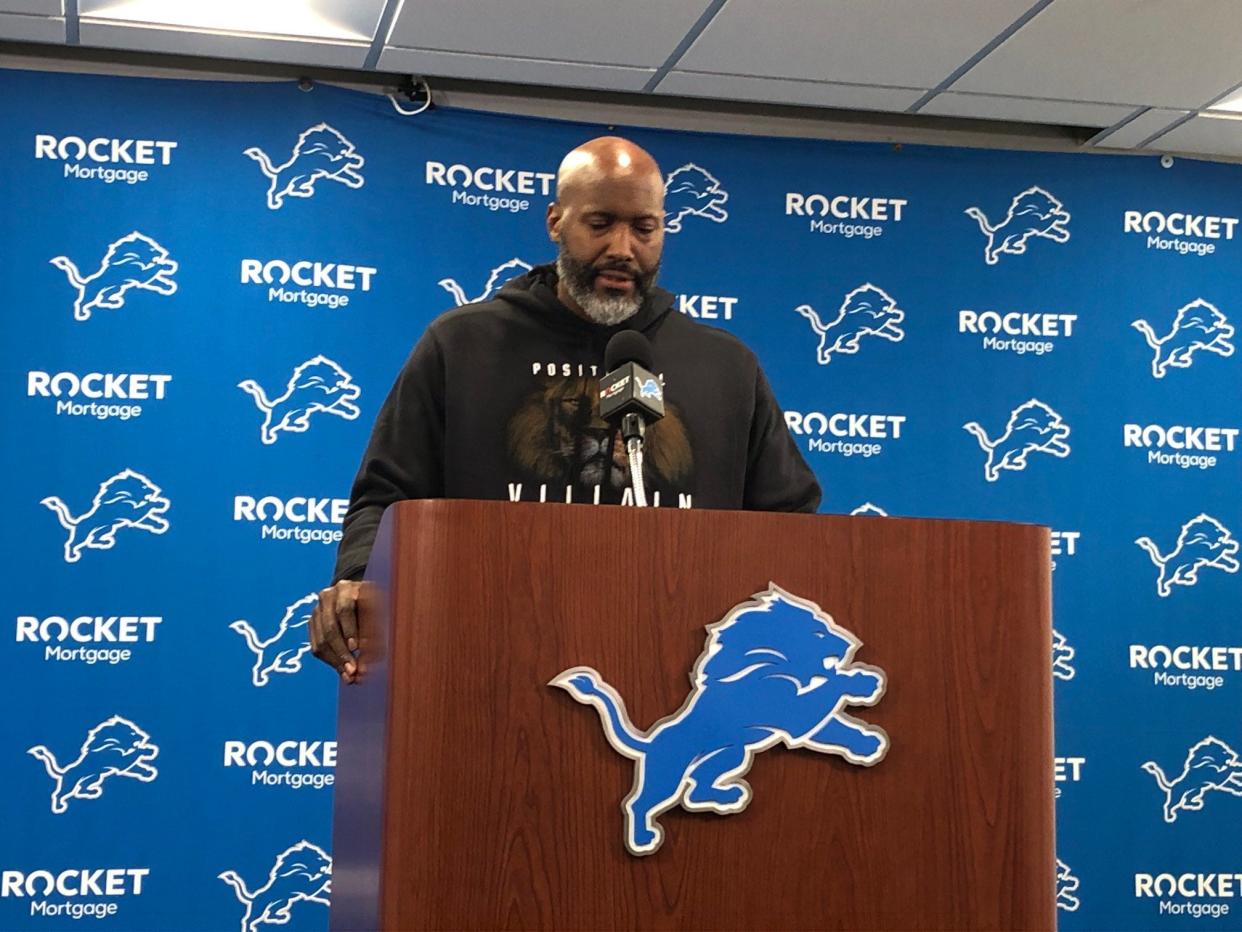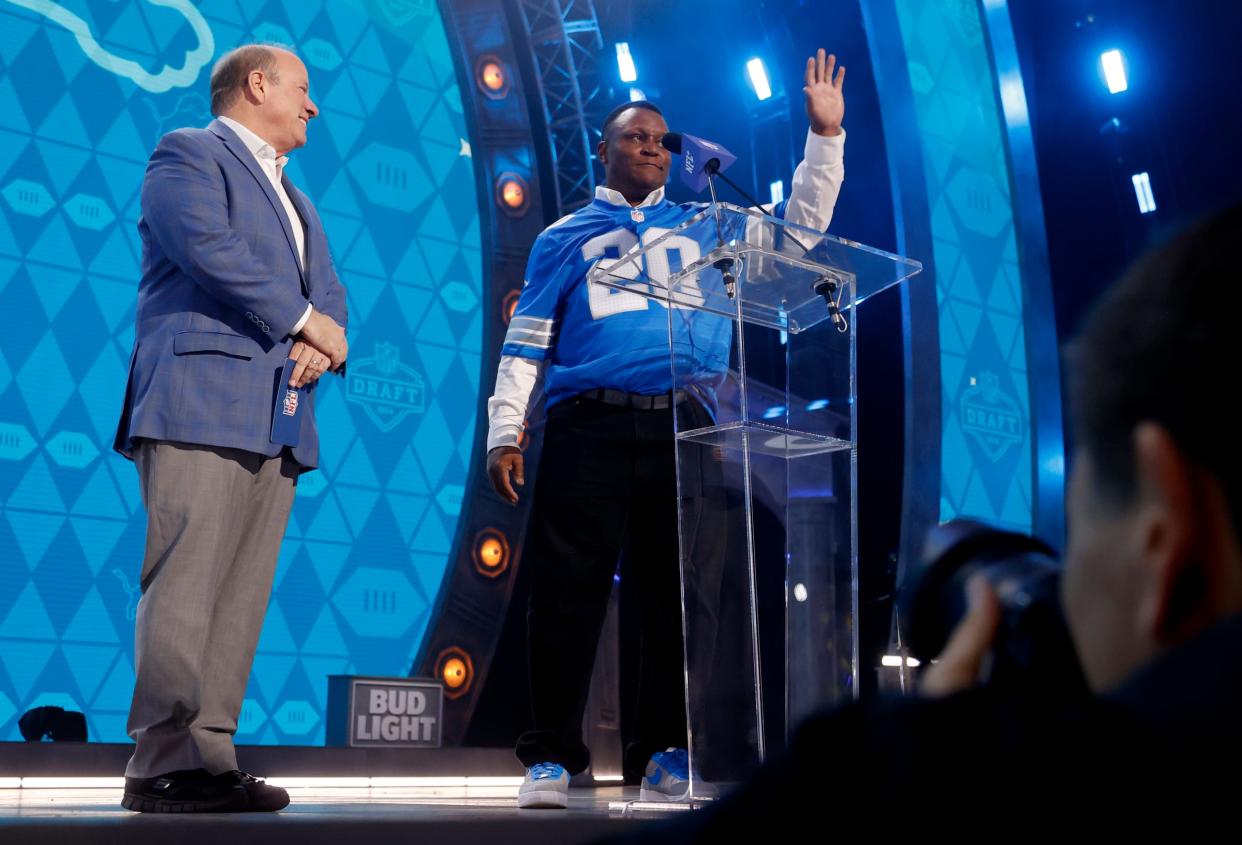Detroit Lions going from bandwagon to villains? As long as it works ...
Everybody wants to be a villain, but nobody wants to be a villain. And if everybody’s a villain, then nobody’s a villain, and in sports, nobody’s a villain until they win, and usually win a lot.
The Detroit Lions are hardly villainous, though you’d be hard pressed to convince Brad Holmes, what with the black hoodie the Lions’ general manager sported Friday night at the draft — hoodies also worn by his apparent fellows in villainy at the team’s headquarters in Allen Park.
Even everyone’s favorite NFL coach, Dan Campbell, donned black for Day 2 of the NFL draft.
Those hoodies read “Positional Villain,” the words etched in bright white, bracketing a photo of a lion — the lower-case cat, not the team’s logo.

This was a Brad Holmes Special — his idea and design — though he was reluctant to admit the genesis Friday night when he met with reporters after he used the team’s second-round pick to draft Missouri cornerback Ennis Rakestraw Jr..
Yes, another cornerback — positionally valuable, as it were, but a choice of positional value after taking cornerback Terrion Arnold in the first round Thursday night? That's debatable, at least for some — a reminder that everyone has an opinion on NFL draft weekend, as they should.
This is, after all, the draft, an exercise in rampant speculation. If not for opinion, 275,000 people wouldn’t have crammed into Campus Martius to watch on Thursday night, nor would millions more watch on television over the three days.
Holmes hears and sees all of them. It seems like that anyway.
At minimum, he has heard enough opinions questioning his draft choices that he has internalized himself as a draft-day outlier, a buster of norms.
He stores these contrary opinions like shrapnel from a firefight, and he’s quick to dig them out, pardon the metaphor, to use as a kind of receipt. He brought them out soon after the season's end when he met with reporters, delighting in reminding everyone how his anti-positional value picks had worked out last season — Jahmyr Gibbs chief among them.
You don’t take running backs in the first round, the analytics (and analytically inclined football observers) screamed last April.
And maybe he was thinking Friday that some might ding him for drafting consecutive cornerbacks.
The hoodie, then, acted as a form of receipt, a preemptive fashion statement. A silent “I told you so" to quell whatever quibble might be coming his way — which was interesting because almost no one quibbled with Thursday's first-round pick, Terrion Arnold, nor the trade he made to move up and get him.
And while some may wonder why he doubled down on another corner Friday night, by the time he got to the podium in the media room, shortly after he’d selected Rakestraw, he couldn't have had much time to parse the early reactions.
Then again, never doubt the determination of those with chips on their shoulders, regardless of how those chips are manufactured. It has worked for Holmes, and for the Lions; heck, it worked for Amon-Ra St. Brown, Detroit's star receiver who famously keeps a list of the receivers taken before him.
It’s a tactic — and now a tale — as old as spectator sports: Internalize the grumbling; doubt is a wonderful fuel.
But villainy?
Holmes remains cagey about his use of the word, and he smiled when asked if it was his idea to make the hoodies.
“You think this would be my idea?” he asked, grinning. “Can’t tell you.”
He relented eventually, though, admitting the design was his. Which means the message was, too. And since he refused to explain the repeat of the word “villain” — he had similar sweatshirts made up two years ago, only without the word “positional” — allow me to decipher the reasoning here.

The Lions aren’t so much villains as an afterthought. Or worse, a joke. At least they were when Holmes and Campbell arrived. They aren’t anymore, of course, but the underdog identity — think “dawg” more than “dog” — remains.
And when Holmes hears that he isn’t drafting according to someone’s model or ideal ... when he hears that he should be thinking about the value of the position in a given round, he bristles, as if someone is suggesting he doesn’t know what he is doing.
“I didn’t know it was like a thing where you would draft a position regardless of the player,” he said. “That’s the part I couldn’t come to grips with.”
What’s interesting is that whatever issues anyone has with his draft record is but a droplet of doubt in a tsunami of praise for the way he has rebuilt this team through the draft. But then, that’s human nature, no? Spot the shadow in all that light.
Whatever you think of Holmes’ fashion innuendo, or his insistence on playing the “villain,” his beliefs helped lay the foundation of a contender. He didn’t go into this draft seeking a cornerback in the first and second round, he promised.
The board just fell that way, and when it was time to pick, he looked at his board and saw its highest-rated player happened to play cornerback. So, he took one.
And then when it was time to pick again, well, you know.
“Me and Dan (Campbell) were talking (Friday) afternoon about the potential of another corner being the best player,” he said.
In other words, they knew there might be some questions, and they knew they weren’t going to care about those questions, that they were going to take who they were going to take, and then remind everyone why by wearing hoodies.
Even if the villainy — positional or not — is imagined.
This article originally appeared on Detroit Free Press: Detroit Lions embrace the villain role, even if it's a bit early
